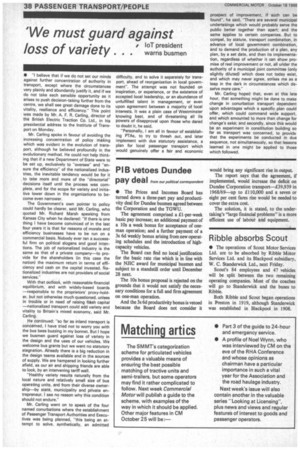'We must guard against
Page 40

If you've noticed an error in this article please click here to report it so we can fix it.
• loT president
loss of variety. . warns busmen
• "I believe that if we do not set our minds against further concentration of authority in transport, except where the circumstances very plainly and abundantly justify it, and if we do not take each sensible opportunity as it arises to push decision-taking further from the centre, we shall see great damage done to its vitality, resilience and efficiency," This point was made by Mr. A. F. R. Carling, director of the British Electric Traction Co. Ltd., in his presidential address to the Institute of Transport on Monday.
Mr. Carling spoke in favour of avoiding the increasing concentration of policy making which was evident in the evolution of transport, although he believed profoundly in the evolutionary method. He could not help thinking that if a new Department of State were to be set up, exclusively to -oversee" and "ensure the efficiency" of the nationalized industries, the inevitable tendency would be for it to take more and more of the "directorial" decisions itself until the process was complete, and for the scope for variety and initiative lower down in the organizations to become even narrower.
The Government's own pointer to policy could hardly be clearer, said Mr. Caning, who quoted Mr. Richard Marsh speaking from Kansas City when he declared: "If there is one thing I have become convinced of in the last four years it is that for reasons of morale and efficiency businesses have to be run on a commercial basis. Nobody ever ran a successful firm on political slogans and good intentions. The job of nationalized industry is the same as that of a private company—to provide for the shareholders (in this case the nation) the maximum return in terms of efficiency and cash on the capital invested. Nationalized industries are not providers of social services."
With that outlook, with reasonable financial equilibrium, and with widely-based boards —responsible to the proprietors' proxy-holder, but not otherwise much questioned, unless in trouble or in need of raising fresh capital —nationalized transport could add variety and vitality to Britain's mixed economy, said Mr. Carling, He continued: "so far as inland transport is concerned, I have tried not to worry you with the bus bees buzzing in my bonnet. But I hope we busmen guard against loss of variety in the design and the uses of our vehicles. We welcome bus grants but we want no statutory stagnation. Already there is a big reduction in the design teams available and in the sources of supply. We are hampered in looking further afield, as our air and shipping friends are able to look, by an intervening tariff wall.
-Healthy variety results naturally from the local nature and relatively small size of bus operating units, and from their diverse ownership—by state, municipality and private entrepreneur. I see no reason why this condition should not endure."
Mr. Carling went on to speak of the four named conurbations where the establishment of Passenger Transport Authorities and Executives was being planned, -this being an attempt to solve, synthetically, an admitted
difficulty, and to solve it separately for transport, ahead of reorganization in local government". The attempt was not founded on inspiration, or experience, or the existence of accepted local leadership, or an abundance of unfulfilled talent in management, or even upon agreement between a majority of local interests. It was a plain case of Westminster knowing best, and of threatening all its powers of disapproval upon those who dared to doubt it, he said.
"Personally, I am all in favour of establishing PTAs, to try to thresh out, and later implement with due statutory assistance, a plan for local passenger transport which would genuinely offer a fair and economic prospect of improvement, if stich can be found", he said. "There are several municipal undertakings which would probably serve the public better together than apart; and the same applies to certain companies. But to compel, by statute, transport combination, in advance of local government combination, and to demand the production of a plan, any plan, by a set date, and then its implementation, regardless of whether it can show promise of real improvement or not, all under the authority of a municipal joint committee (only slightly diluted) which does not today exist, and which may never agree, strikes me as a leap in the dark in circumstances which deserve more care."
Mr. Carling hoped that, even at this late hour, that something might be done to make change in conurbation transport dependent upon advantages which a specific plan could offer, which could command wide support, and which amounted to more than change for change's sake; and secondly, since this would be an experiment in constitution building so far as transport was concerned, to provide that the experiments be conducted in due sequence, not simultaneously, so that lessons learned in one might be applied to those which followed.
























































































































